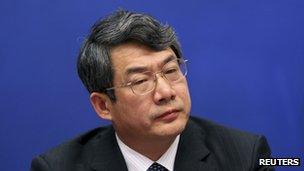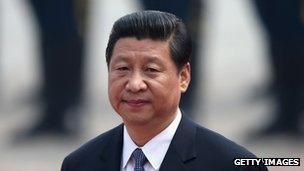How a Chinese journalist took on a top official
- Published

Liu Tienan is being investigated for "suspected serious disciplinary violations"
In China, it takes a lot of courage for a journalist to accuse a senior Communist Party official of corruption.
Luo Changping, a seasoned newspaper reporter, told the BBC by e-mail that he was "exhausted both in heart and body" after waging a long campaign to expose the shady dealings of Liu Tienan, a top economic planning official.
On Sunday, Chinese authorities announced Mr Liu was under investigation for "serious disciplinary violations".
Mr Liu has also been fired from his position as the deputy head of China's central National Development and Reform Commission.
Last December, Caijing, the respected business magazine where Luo Changping, 32, serves as deputy editor, published an article accusing Liu Tienan's wife and son of illegal business dealings.
The article did not mention Mr Liu by name. Instead, it simply stated he was a high-ranking official with the national economic planning committee.
The investigative journalist, Luo Changping, was not so reserved.
In three hard-hitting posts on weibo, China's equivalent of Twitter, Mr Luo argued Liu Tienan and his family had enriched themselves by obtaining illegal loans from Chinese banks.
Mr Liu was also accused of lying about his education and issuing death threats to his former mistress.
Then, for months, both Mr Luo and the Chinese media fell silent on the topic. That is, until China's anti-corruption agency announced it was investigating Liu Tienan.
After that, the floodgates opened. The Chinese media published reports on Liu Tienan's investigation and Mr Luo's own newspaper, Caijing, reposted his allegations on Caijing's weibo account.
So, do Chinese journalists now have the green light to target corrupt officials?
Not necessarily, says Zhan Jiang, a journalism professor at Beijing Foreign Studies University, who describes the Chinese media landscape as "one country, many situations".
"There is no stable media policy," Prof Zhan explains.
"On one hand, you can say so many journalists and media are suppressed by the authorities. But on the other hand, you can say so many courageous journalists and media are trying to do a very good job in China."
Account deleted

Chinese President Xi Jinping has said he wants to make tackling corruption a priority
Luo Changping, the journalist, was able to publish his allegations on weibo, rather than in the print version of the Caijing magazine, because the two outlets are ruled by separate groups.
"Information on the internet is controlled by the State News Office," Prof Zhan says, while "print media are controlled by the Central Propaganda Office."
"These two government organs have different views. One is more open-minded and one is more reserved."
It helps, too, that Luo Changping was writing about government corruption, a key target of the new Chinese government headed by Xi Jinping.
"Investigations of senior officials are relatively rare, as more reports tend to focus on local officials. However, given the current top-down campaign against corruption, I think the report is less surprising, as it tunes in with the agenda of the party-state," explains Maria Repnikova, a doctoral candidate at Oxford University who studies media-state relations in China.
Nonetheless, Luo Changping's attempts to publicise his research into the official, Liu Tienan, seem to have hit another road block.
After the corruption investigation was announced, Mr Luo promised to release all of his information on the story.
However, his internet account was soon deleted.
In a brief email to the BBC, Mr Luo did not appear to be optimistic about the future.
"[The announcement of a corruption investigation into Liu Tienan] is only a breakthrough in one case," he wrote. "There's no change to the whole system."
- Published13 May 2013
- Published3 May 2013
- Published14 March 2013
- Published28 January 2013